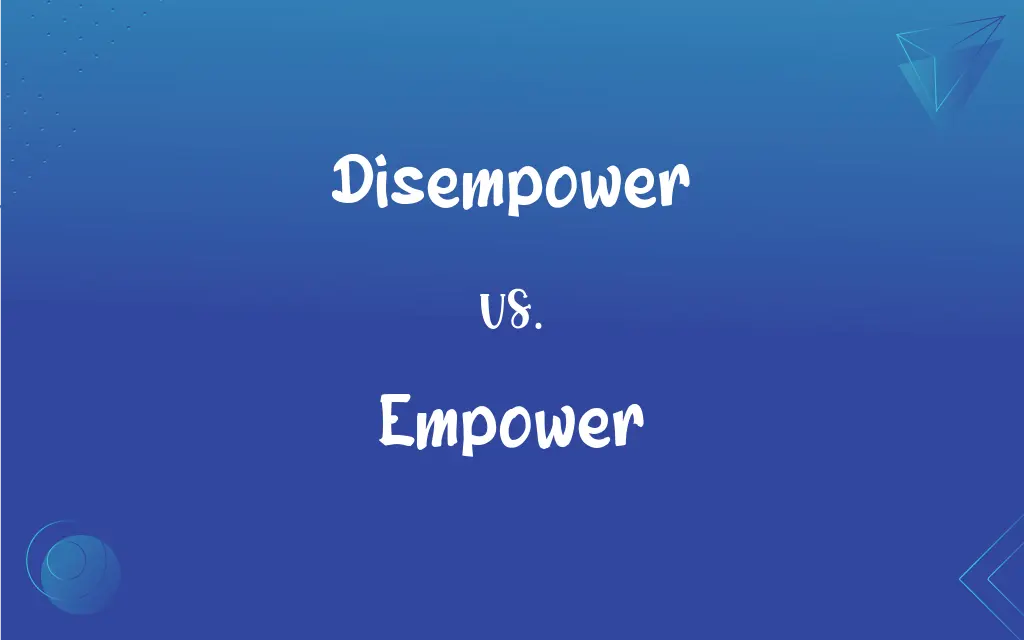Disempower vs. Empower: What's the Difference?
Edited by Harlon Moss || By Janet White || Updated on November 13, 2023
"Disempower" means to take away power, authority, or influence from someone or something, whereas "empower" is to give power, authority, or influence.

Key Differences
Disempowerment involves reducing or removing someone's power, authority, or influence, leading to a sense of helplessness or weakness. Empowerment, in contrast, is the process of increasing the degree of autonomy and self-determination in people or communities to enable them to represent their interests.
Actions or policies that disempower individuals or groups take away their ability to make decisions, diminishing their agency. Empowerment, on the other hand, involves providing individuals or groups with the tools and resources necessary to make choices and exert influence.
Disempowerment can manifest in social, political, or personal contexts, often resulting in marginalization. Empowerment is used as a key tool in personal development and social justice movements, fostering participation, and engagement.
Disempowering actions can lead to dependence and lack of confidence, while empowering actions build confidence, skills, and capabilities.
The concept of disempowerment is often associated with oppression and inequality, whereas empowerment is linked with liberation and equality.
ADVERTISEMENT
Comparison Chart
Definition
Taking away power, authority, or influence
Giving power, authority, or influence
Effect on Individuals
Leads to helplessness, dependence
Increases autonomy, confidence
Contexts
Often in oppressive or marginalizing situations
In personal development, social justice
Outcome
Reduction in agency and decision-making ability
Enhancement of skills, capabilities
Associated With
Inequality, oppression
Equality, liberation
ADVERTISEMENT
Disempower and Empower Definitions
Disempower
To decrease someone's ability to make decisions.
Restrictive laws disempower citizens from political participation.
Empower
To build confidence and capability.
Education is a powerful tool to empower individuals.
Disempower
To remove or reduce autonomy.
Lack of access to education can disempower a community.
Empower
Give or delegate power or authority to;
She authorized her assistant to sign the papers
Disempower
To reduce someone's power or influence.
Unfair policies can disempower minority groups.
Empower
To give someone power or authority.
Training programs empower employees to take on new challenges.
Disempower
To make someone weaker or less confident.
Bullying can disempower its victims.
Empower
To enable or authorize.
The new policy will empower local governments.
Disempower
To take away authority or control.
Centralizing decisions in management can disempower employees.
Empower
To increase the degree of autonomy and self-determination.
Empowering women is key to community development.
Disempower
To deprive of power or influence.
Empower
To promote self-actualization and influence.
Social movements aim to empower marginalized communities.
Disempower
To strip power from (someone or some group), as:
Empower
To invest with power, especially legal power or official authority.
Disempower
To remove morale or self-confidence from (someone or some group) to do something.
Empower
To equip or supply with an ability; enable
"Computers ... empower students to become intellectual explorers" (Edward B. Fiske).
Disempower
To remove authority or (official) confidence from (someone or some group) to do something (such as administer a state function), as by demoting, disestablishing, or unincorporating a group.
The reformation disempowered the established church and thus roiled the aristocracy.
Empower
(transitive) To give permission, power, or the legal right to do something.
Disempower
To deprive of power; to divest of strength.
Empower
(transitive) To give someone more confidence and/or strength to do something, often by enabling them to increase their control over their own life or situation.
John found that starting up his own business empowered him greatly in social situations.
Empower
To give authority to; to delegate power to; to commission; to authorize (having commonly a legal force); as, the Supreme Court is empowered to try and decide cases, civil or criminal; the attorney is empowered to sign an acquittance, and discharge the debtor.
Empower
To give moral or physical power, faculties, or abilities to.
Empower
To enable or permit; to give more opportunity for independent action.
Empower
Give qualities or abilities to
FAQs
Are empowerment programs always successful?
Not always; success depends on how well they are designed and implemented.
Is empowerment only relevant in social justice?
While often used in social justice, empowerment is also relevant in personal and professional development.
Can laws disempower people?
Yes, laws that limit freedoms or rights can disempower individuals or groups.
How can empowerment be measured?
It can be measured through increased autonomy, decision-making ability, and confidence.
What role do leaders play in empowerment?
Effective leaders play a crucial role in empowering their teams or communities.
Can financial independence empower individuals?
Yes, financial independence is a key factor in empowerment.
Does disempowerment affect mental health?
Yes, it can lead to feelings of helplessness and affect mental well-being.
Can education empower people?
Yes, education is a key factor in empowering individuals by increasing knowledge and opportunities.
Can a person be both empowered and disempowered?
Yes, in different aspects of their life or at different times, a person can experience both.
Is disempowerment always intentional?
It can be either intentional or an unintended consequence of certain actions or policies.
Does disempowerment always involve direct action?
Not necessarily; it can also be the result of neglect or passive actions.
Are there cultural aspects to empowerment?
Yes, cultural norms and values significantly influence how empowerment is perceived and achieved.
How can communities be empowered?
Through education, resources, and support in decision-making processes.
Are there government initiatives to empower citizens?
Yes, various government programs aim to empower citizens in different aspects.
Can technology disempower people?
Yes, when it limits personal interaction or creates dependency, it can disempower.
Is empowerment a one-time process?
Empowerment is often an ongoing process of growth and development.
What is self-empowerment?
Self-empowerment is the process of gaining strength and confidence in one's own abilities.
Does social media empower or disempower people?
It can do both, depending on how it is used.
Can disempowerment lead to social exclusion?
Yes, disempowerment can contribute to social exclusion and marginalization.
How important is community support for empowerment?
Community support is crucial for effective and sustainable empowerment.
About Author
Written by
Janet WhiteJanet White has been an esteemed writer and blogger for Difference Wiki. Holding a Master's degree in Science and Medical Journalism from the prestigious Boston University, she has consistently demonstrated her expertise and passion for her field. When she's not immersed in her work, Janet relishes her time exercising, delving into a good book, and cherishing moments with friends and family.
Edited by
Harlon MossHarlon is a seasoned quality moderator and accomplished content writer for Difference Wiki. An alumnus of the prestigious University of California, he earned his degree in Computer Science. Leveraging his academic background, Harlon brings a meticulous and informed perspective to his work, ensuring content accuracy and excellence.































































